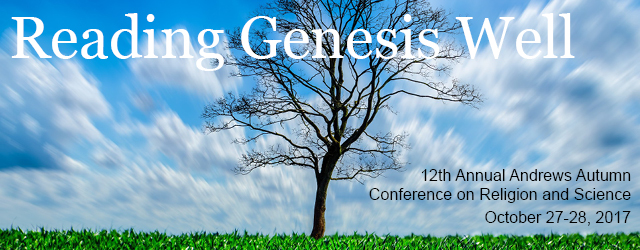Keynote Presentation: “Can Linguistics and Literary Studies Help Us Read Genesis Well?”
Presenter Status
Professor of Old Testament
Location
Biology Amphitheater, Price Hall 106
Start Date
28-10-2017 9:30 AM
End Date
28-10-2017 10:30 AM
Description
ABSTRACT
Many disagreements over what to make of Genesis 1–11 stem from different ways of reading the text. We can provide a critically rigorous approach to interpreting the Bible by taking linguistic, literary, and philosophical insights from C.S. Lewis, and bringing them into conversation with ideas from modern linguistics, such as lexical semantics, discourse analysis, and sociolinguistics. Lewis gives guidance in how to talk about imagistic language as having genuine referentiality; he also provides the tools by which we can return the category of phenomenal language to respectability. Further, this study will allow us to evaluate to what extent it is proper to say, as many do, that the Bible writers held a “primitive” picture of the world, and what function their portrayal of the world and its contents had in shaping the community.
BIO
Dr. Collins served as Old Testament chair on the translation committee for the English Standard Version of the Bible, and also as the Old Testament Editor for the ESV Study Bible. Collins has served as a church planter, and his background also includes advanced studies in linguistics and biblical languages. He has written extensively on biblical languages and interpretation, and on science and the Christian faith. His published books include Did Adam and Even Really Exist?, Science and Faith: Friends or Foes?, and Genesis 1-4: A Linguistic, Literary, and Theological Commentary, among others.
Keynote Presentation: “Can Linguistics and Literary Studies Help Us Read Genesis Well?”
Biology Amphitheater, Price Hall 106
ABSTRACT
Many disagreements over what to make of Genesis 1–11 stem from different ways of reading the text. We can provide a critically rigorous approach to interpreting the Bible by taking linguistic, literary, and philosophical insights from C.S. Lewis, and bringing them into conversation with ideas from modern linguistics, such as lexical semantics, discourse analysis, and sociolinguistics. Lewis gives guidance in how to talk about imagistic language as having genuine referentiality; he also provides the tools by which we can return the category of phenomenal language to respectability. Further, this study will allow us to evaluate to what extent it is proper to say, as many do, that the Bible writers held a “primitive” picture of the world, and what function their portrayal of the world and its contents had in shaping the community.
BIO
Dr. Collins served as Old Testament chair on the translation committee for the English Standard Version of the Bible, and also as the Old Testament Editor for the ESV Study Bible. Collins has served as a church planter, and his background also includes advanced studies in linguistics and biblical languages. He has written extensively on biblical languages and interpretation, and on science and the Christian faith. His published books include Did Adam and Even Really Exist?, Science and Faith: Friends or Foes?, and Genesis 1-4: A Linguistic, Literary, and Theological Commentary, among others.



